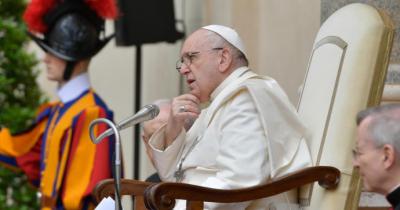Vatican employees protest Pope's pay cuts

VATICAN CITY - The employees of the Holy See have signed an unprecedented petition protesting recent pay cuts legislated by Pope Francis.
The pontiff ordered several pay cuts to help cope with the Holy See’s deficit, in 2021 though to be around 49.7 million euros, as a result of the financial crisis brought on by the coronavirus pandemic.
In the petition, the Vatican employees expressed “disappointment and deep discouragement” for the decision, lamenting “the inconsistencies that still remain in the Vatican and which make these measures unfair and to the detriment of honest workers.”
"The halt to recruitments (with inevitable overloading of employees already in service), the suspension of promotions and salary level changes (despite the increased work responsibilities), the non-payment of overtime hours, the hours spent at home during lockdown with the impossibility of smart-working, and now the cut in the biennial pay rises, do nothing but aggravate the working conditions of Vatican employees.”
The petition went on to quote the Bible, “we cannot fail, Your Holiness, to mention the concept of 'just reward' which is spoken of in the Gospel of Matthew (20:1-16) or 'the due reward' referred to in Jeremiah 22:13 or James 5:4. How much more we will have to sacrifice to pay for a budget deficit that is certainly not the result of our own misdeeds?”
The petition continued that, “seniority pay rises should compensate for everything that the Vatican, compared to private companies, does not include (productivity bonuses, promotions based on the objectives achieved, meritocratic system of selection and professional growth, etc.). We believe that the current context does not lend itself to such radical interventions, at least until forward-looking and insightful are put in place, capable of transforming the financial infrastructure. With great bitterness that we note that many of the reform proposals put forward by the Economic Council concerning human resources have not been taken seriously.”
The petition outline three principal complaints. The first is that while some dicasteries continue to hire staff, pay overtime and give pay rises, while others have put a stop to all of this. “Within the same organisation,” it reads, “there are obvious disparities in the treatment of employees which are no longer tolerable.”
The second is of the treatment of external, lay consultants and managers, whose contracts go up to 25,000 euros a month, “too much, for a system like ours, which should be based on the spirit of 'service to the Church'. In our view, this should be looked at in more depth and, if necessary, reformed. What is more serious, in reference to the motu proprio, is the exclusion of the most prosperous categories [of employee] from the reduction of salaries.”
The petition’s third complaint is “at the way in which the superiors of the Secretariat for the Economy have decided to achieve this goal, which is so mortifying for the employees, without consulting them in any way… Sacrificing oneself for a common good is fine, provided that it is done in proportion to the economic capabilities of the individual and after having solved the enormous critical issues that permeate the entire system.”
The employees have asked Pope Francis to meet with a small group of representatives to discuss the issues.
ol


